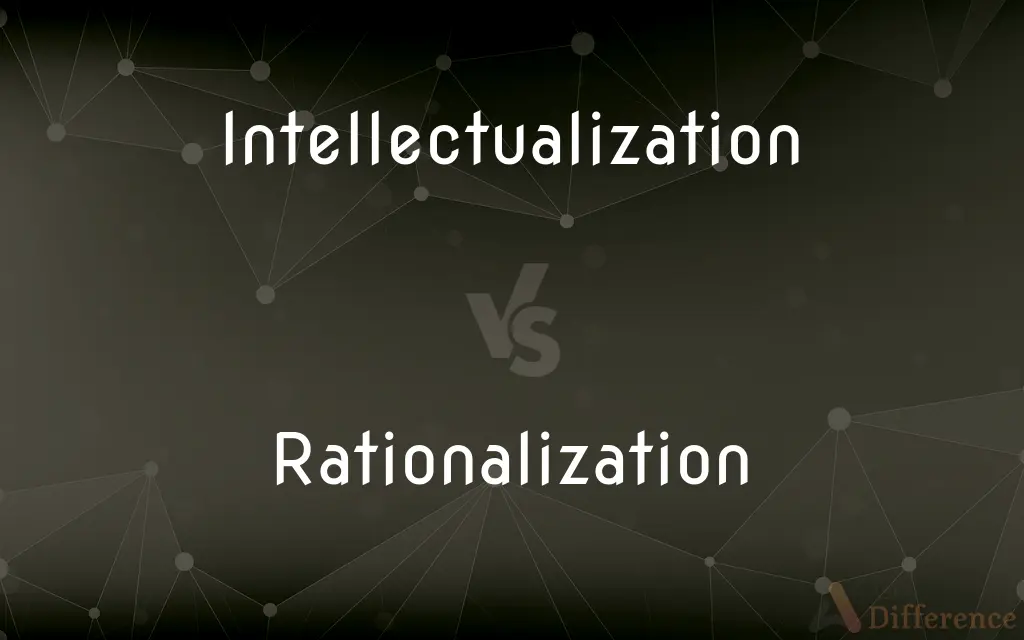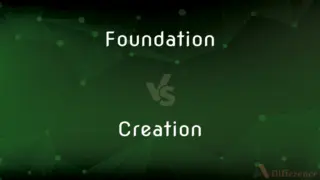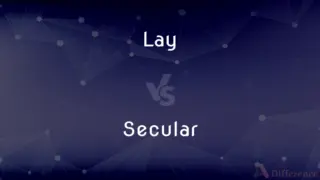Intellectualization vs. Rationalization — What's the Difference?
By Tayyaba Rehman & Fiza Rafique — Updated on April 29, 2024
Intellectualization involves using academic or complex language to detach from emotions, whereas rationalization justifies actions with seemingly logical reasons to avoid uncomfortable truths.

Difference Between Intellectualization and Rationalization
Table of Contents
ADVERTISEMENT
Key Differences
Intellectualization is a defense mechanism where a person focuses on thinking about a situation in complex or high-level terms, which helps them avoid the emotional aspects. Whereas rationalization involves creating a reasonable-sounding excuse for behaviors or feelings that might otherwise be unacceptable.
When intellectualizing, an individual might discuss problems in abstract concepts or technical jargon, distancing themselves from the emotional impact. On the other hand, someone rationalizing might justify their actions or feelings by aligning them with socially acceptable explanations.
Intellectualization can often appear as overly academic or philosophical discussions that prevent emotional connection or confrontation. Conversely, rationalization often seems to fit into everyday logic, making an action or emotion seem justified under the circumstances.
A key aspect of intellectualization is its use in clinical psychology to describe a way patients might avoid emotional distress by burying themselves in details. Whereas rationalization is recognized as a way individuals explain away stress or guilt to preserve self-esteem.
While intellectualization can sometimes serve a protective function by helping individuals cope with stress through detachment, rationalization can potentially lead to patterns of denial and self-deception, impacting personal growth and relationships.
ADVERTISEMENT
Comparison Chart
Definition
Using complex thought to avoid emotional stress.
Creating excuses to justify actions or feelings.
Psychological Function
Avoids emotional distress by focusing on logic.
Justifies behaviors to avoid guilt or shame.
Common Usage
More academic, clinical settings.
Everyday situations and decisions.
Impact on Relationships
Can create emotional distance.
Can lead to misunderstanding or conflict.
Long-term Effects
May prevent emotional growth.
May foster ongoing denial or self-deception.
Compare with Definitions
Intellectualization
Detaching emotionally by shifting discussions to theoretical or impersonal topics.
During therapy, he intellectualized his fears by talking about historical trends.
Rationalization
Using reasonable-sounding arguments to cover up failures or shortcomings.
He rationalized his poor performance by blaming unclear instructions.
Intellectualization
Employing philosophical or abstract thinking as a defense against emotional pain.
She spoke about existentialism to intellectualize her feelings of loneliness.
Rationalization
Justifying actions by attributing them to acceptable social norms.
He rationalized his aggressive behavior by claiming it was just competitive spirit.
Intellectualization
Discussing personal issues in overly technical terms to avoid emotional distress.
He intellectualized his breakup by discussing attachment theory.
Rationalization
Creating logical reasons to avoid acknowledging true motives or errors.
She rationalized her lateness by blaming traffic, despite leaving late.
Intellectualization
Focusing on intellectual aspects to avoid dealing with emotional realities.
She turned the conversation about her job loss into a discussion on economic theory.
Rationalization
Explaining away emotional reactions or decisions under the guise of logic.
She rationalized her purchase of an expensive car as a 'necessary investment.'
Intellectualization
Using high-level or academic concepts to detach from emotional content.
She intellectualized her grief by focusing on the biological processes of death.
Rationalization
Making excuses to justify questionable behavior or thoughts.
He rationalized cheating on the test because everyone else was doing it.
Intellectualization
In psychology, intellectualization is a defense mechanism by which reasoning is used to block confrontation with an unconscious conflict and its associated emotional stress – where thinking is used to avoid feeling. It involves removing one's self, emotionally, from a stressful event.
Rationalization
The act, process, or practice of rationalizing.
Intellectualization
The act or process of intellectualizing.
Rationalization
An instance of rationalizing.
Intellectualization
An unconscious means of protecting oneself from the emotional stress and anxiety associated with confronting painful personal fears or problems by excessive reasoning.
Rationalization
The process, or result of rationalizing.
Intellectualization
The act or process of intellectualizing.
Rationalization
A statement of one's motives, or of the causes of some event.
Intellectualization
(psychiatry) a defense mechanism that uses reasoning to block out emotional stress and conflict
Rationalization
A reorganization of a company or organization in order to improve its efficiency.
Rationalization
(psychiatry) The concealment of true motivation in some non-threatening way.
Rationalization
(mathematics) The simplification of an expression without changing its value.
Rationalization
The act or process of rationalizing.
Rationalization
The cognitive process of making something seem consistent with or based on reason
Rationalization
(psychiatry) a defense mechanism by which your true motivation is concealed by explaining your actions and feelings in a way that is not threatening
Rationalization
(mathematics) the simplification of an expression or equation by eliminating radicals without changing the value of the expression or the roots of the equation
Rationalization
The organization of a business according to scientific principles of management in order to increase efficiency
Rationalization
Systematic organization; the act of organizing something according to a system or a rationale
Common Curiosities
Can intellectualization be a positive coping strategy?
While it can temporarily shield someone from pain, overuse can hinder emotional processing and personal growth.
What is rationalization?
Rationalization is a defense mechanism where individuals create plausible but misleading explanations for their behavior or feelings.
Is rationalization harmful?
It can be harmful as it often prevents individuals from confronting the truth about their actions or feelings, leading to unresolved issues.
Why do people rationalize their actions?
Typically, to defend against feelings of guilt or inadequacy and to maintain a positive self-image.
How does intellectualization affect relationships?
It can create a barrier to emotional intimacy, as the person avoids engaging on an emotional level.
How are intellectualization and rationalization similar?
Both are defense mechanisms used to protect oneself from psychological distress.
What leads a person to intellectualize?
Often, it's an unconscious effort to manage anxiety, stress, or emotional pain by focusing on intellectual detachment.
Are there specific situations where intellectualization is more likely to occur?
It's often observed in scenarios involving significant emotional stress, such as in serious medical or existential discussions.
What is intellectualization?
Intellectualization is a psychological defense mechanism where an individual uses complex thinking to detach from their emotional experiences.
How are intellectualization and rationalization different?
Intellectualization avoids emotional engagement through complex thought, while rationalization seeks to justify behaviors or feelings with reasonable explanations.
What are the long-term effects of excessive intellectualization?
It can lead to a lack of genuine emotional expression and difficulty in forming deep personal connections.
How can someone recognize if they are intellectualizing?
A key indicator is the consistent diversion of discussions from emotional to abstract or theoretical topics.
How can someone stop rationalizing?
Awareness and acknowledgment of the behavior are the first steps, followed by actively confronting and addressing the underlying emotional issues.
What are the long-term effects of continuous rationalization?
Persistent rationalization can lead to a pattern of dishonesty and self-deception, affecting personal and professional relationships.
In what scenarios is rationalization commonly used?
It is commonly employed in everyday situations where individuals need to justify actions that are inconsistent with their self-image or societal norms.
Share Your Discovery

Previous Comparison
Foundation vs. Creation
Next Comparison
Lay vs. SecularAuthor Spotlight
Written by
Tayyaba RehmanTayyaba Rehman is a distinguished writer, currently serving as a primary contributor to askdifference.com. As a researcher in semantics and etymology, Tayyaba's passion for the complexity of languages and their distinctions has found a perfect home on the platform. Tayyaba delves into the intricacies of language, distinguishing between commonly confused words and phrases, thereby providing clarity for readers worldwide.
Co-written by
Fiza RafiqueFiza Rafique is a skilled content writer at AskDifference.com, where she meticulously refines and enhances written pieces. Drawing from her vast editorial expertise, Fiza ensures clarity, accuracy, and precision in every article. Passionate about language, she continually seeks to elevate the quality of content for readers worldwide.
















































